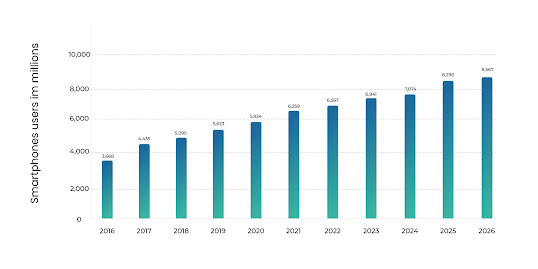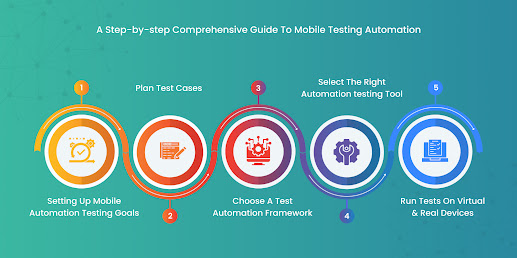Dubai has opened the doors wide for a tech hub. If you have a business in Dubai or are planning to expand your business, app development is something no business can ignore. And hiring expert app developers in Dubai can help you a lot to achieve your business goals. Want to know how? Keep reading the article to learn more.
App development is crucial for all businesses, regardless of size, across the globe, and Dubai is no exception to it. According to the new Dubai Economic Agenda, the key goal is to scale up the possibilities for tech ventures globally.
Moreover, According to research, In 2023, apps are expected to generate more than USD $935 billion. Mobile apps have helped businesses empower and grow their sales with time.
An ideal app idea can change the scope of your business. And to put the idea into action, you need the help of app developers.
But how do hire app developers cost-effectively in Dubai?
How will you find developers who ensure high-quality app development?
In this blog, you will get the answers to all your questions. Let us now dive deeper into the blog and learn how to hire an app developer in Dubai.
What is the most effective way to hire app developers in Dubai?
Hiring an app developer can be tricky. You must be aware of the budget and also should know if you need to hire a developer or an app development company for your development process. Here are the top suggestions that can help you find the ideal developer.
- Well research
- Examine their experience
- Ability to communicate
- Establish goals
- Through interview
Now let us explain all these points in detail.
Well research: Before handling your project with developers, you must do thorough research to understand what is required and what is new in the industry. Additionally, you can ask the consultants or the professionals to understand more about the industry. Learn about the cost, programming languages, and the best outsourcing companies. Having detailed knowledge about the industry can help you make better decisions.
Examine the developer’s experience: Learn properly about the developer’s experience and expertise, whether they have ever created an app similar or not. Gather all the essential information about the developers before hiring them, it will give you a better notion of what to expect from the developer that you are planning to hire.
Ability to communicate: With all other technical skills, it is crucial to have good communication skills. The developer must understand the project requirements clearly. Also, clear communication help in effective and efficient product development.
Establish goals: It is crucial to know and understand business requirements clearly. It helps you to avoid conflicts and enhances the development process. So, ensure that you communicate your requirements and convey your goals or expectations.
Through interview: Interview is another crucial aspect that can not be ignored. Ensure that you interview the candidate properly. If possible, take the help of an expert who can help you with the interview. Furthermore, here are a few things to consider before collaborating with any developer.
- Their references and reviews
- Exposure to the industry in general
- Expertise
- Programming technologies
- Development approach
- Contracts and legal procedures
- Project management
- Communication
A few questions you must ask yourself before hiring
What is the size of the budget for the mobile app development project?
Do I want to engage a freelance app developer or avail of mobile app development services?
What are the main obstacles I will face in my search for mobile app developers? It must include
- Budget
- Freelancing websites
- In-house mobile app developers
- Outsourcing
- Steps to hire an app developer
Here are a few steps involved that can help you hire an app developer:
Make a budget: Confirm your budget and make a list of all your requirements. Also, ensure that the developer you are choosing can manage the concept and project details. Choose the developers who can give you quality services within your defined budget.
Search for a developer: Begin your search for a developer or an experienced development company by asking yourself questions such as “How can I hire an app developer?” or “Where can I find a mobile app developer?”. Contact the developers from the development communities or the hiring boards.
Screening: The first step towards hiring is screening. Make a list of developers you think are qualified for the job. Then choose the one that fits well according to your needs. Ensure that you hire a developer who has already worked on a similar project in the past.
Get in touch with the developer: After you research the development company, you should contact them directly. Direct communication can assist you in making the right decision. Also, you must conduct interviews with the developers, it will give you an idea about their expertise.
Make an all-inclusive request: Ensure that the developer you hire can do research, create the app’s UI/UX, and test. Moreover, if you want to build an app for the business, it is suggested to hire an app development team.
Recruit the team: It is time to recruit a mobile app development team. You can discuss the non-disclosure agreement for security purposes. You can start the development process once after signing the relevant agreements.
To summarize:
To sum it up, it is not a simple task to hire the right developer. There are a few criteria that help you choose the perfect applicant for the job. Moreover, with the competition in the market, it is not easy to find a qualified mobile app developer. Because of that, finding the best app development company or developer is costly and time-consuming.
So, what is the solution?
How will you get high-quality developers within your budget?
ToXSL Technologies can help you here. We at ToXSL Technologies are the leading Mobile App Development Company in the market. Our developers are highly-qualified and well-versed with the latest technology and ensure that you get the best and high-quality apps in the market. Hire app developers in Dubai with us, and we will help you empower your business globally.









